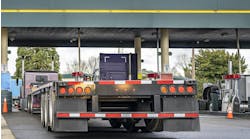Most fleet operators know how important shock absorbers are for controlling (absorbing) the up-and-down movement (shock) created by their trucks' springs when they hit a bump. In addition to smoothing the ride for drivers and cargo, however, shocks are also critical in keeping the truck in control after hitting a bump, thereby saving wear and tear on the entire vehicle, including critical suspension system components.
The manufacturers of shock absorbers for the truck industry say their goal is to provide fleet users with longer lasting, more durable shocks. ArvinMeritor's Nelson Goncalves, director, business development and product management-suspension and ride control, worldwide, says “optimized handling and road surface conservation is playing an increasingly important role in the development of shock absorbers. Complex demands for vehicle damping require variable damping systems.”
Goncalves points out that variable damping systems can greatly increase driver comfort, while ensuring sufficient driver safety and stability. ArvinMeritor offers both pneumatic and electronic variable damping systems, marketed under the Gabriel shocks brand.
“Unlike standard dampers that compromise vehicle comfort or control,” Goncalves explains, “variable damping systems can enhance both. Electronic controls are essential to electronically adjustable damping systems and other variable damping solutions.”
In the aftermarket, ArvinMeritor offers the Gabriel Fleetline of heavy truck shocks as direct OE replacement shocks. They feature an enhanced valving rate to compensate for initial suspension softening, the company notes. The Gabriel GasSLX heavy truck shocks are designed to be the versatile upgrade option for multiple application needs.
ZF Sachs stresses the importance of selecting the correct shock absorber. The company notes its OE shocks are designed together with the vehicle OEM and tuned for the specific vehicle/application to give optimal performance and save fleets on maintenance costs. A properly tuned shock, the manufacturer explains, will extend tire life by minimizing wheel hop. It will also enhance vehicle control and stability, while providing safety and driver comfort.
Jim King, sales manager, heavy-duty suspension, ZF Sachs, notes his company “works towards a goal of a 300,000-mile lifespan for every shock….” The primary function of a shock, he explains, is to keep the wheel in contact with the road and dampen road surface impact. When a shock fails, it can increase fatigue on the entire suspension system. That's why it's so important for fleets to correctly diagnose a failed shock.
The manufacturer advises technicians to check for signs of worn bushings, broken mounts and damaged dust tubes. Also look for obvious signs of oil leakage, especially near the upper end of the shock. If the top of the shock is not wet to the touch but looks somewhat oily/dusty, says King, “this is referred to as ‘misting’ and is part of the normal operation. About 80% of warranty claims we receive are misdiagnosed.”
Monroe, division of Tenneco, manufactures and markets a variety of shock absorbers for light- and heavy-duty truck markets. Its product line includes gas-charged Monroe Gas-Magnum shocks for class 3-8 vehicles with both air spring and tapered-leaf suspensions, as well as Monro-Magnum shocks for transit vehicles and class 7 and 8 applications. Also available are extra-durable Monroe Severe Service shock absorbers, which are specifically engineered for emergency, municipal fleet and construction uses, along with trailer retrofit kits and Cab shocks.
Cab shocks, Monroe reports, are becoming increasingly common on today's OTR trucks. They reduce the transmission of wheel vibration and bump steer to the driver. This increased isolation, Monroe explains, can also increase driver comfort and steering precision.
Mark Christiaanse, director of product management for Monroe, says, “Many fleets are beginning to view the steering and suspension as a true system, which makes sense. Tires, shocks, brakes and steering linkage components are truly interdependent, and the service life and performance of tires and key chassis parts can be significantly impacted by the condition of a vehicle's shock absorbers.”
FOR MORE INFORMATION, VISIT THESE WEB SITES:
ARVINMERITOR
www.arvinmeritor.com
MONROE, DIVISION TENNECO
www.monroeheavyduty.com
ZF SACHS
www.zf.com


